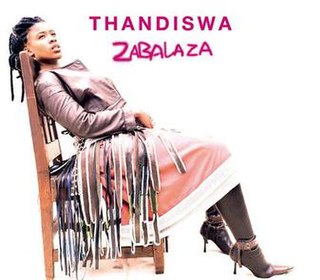Kwaito is a music genre that emerged in Soweto, Johannesburg, South Africa, between the late 1980s and 1990s. It is a variant of house music that features the use of African sounds and samples. Kwaito songs occur at a slower tempo range than other styles of house music and often contain catchy melodic and percussive loop samples, deep bass lines and vocals. They are also very similar tempos to early 1990s NYC house tracks.
Mduduzi ThembinkosiEdmund Tshabalala, also known as Mandoza, was a South African singer-songwriter and kwaito recording artist. He was known for his contributions to the kwaito genre and his numerous hit singles, including "Nkalakatha", "Uzoyithola Kanjani, Tornado", "Sgelekeqe", "Ngalabesi", "Godoba", "Tsotsi Yase Zola" and "Indoda", which topped the charts in South Africa and all over the African continent. His second album Nkalakatha, released in 2000, became the biggest selling album of his career, selling 350,000 units.
TKZee is a South African kwaito music group formed in 1990s by three school friends, Tokollo Tshabalala, Kabelo Mabalane, and Zwai Bala. The group shot to prominence in late 1997 and early 1998 with their chart-topping singles "Palafala" and "Shibobo".

Zabalaza is the first solo album release from the South African musical performer, Thandiswa Mazwai. Before this album, Thandiswa was most famously known as the lead singer for the kwaito group Bongo Maffin. Zabalaza incorporates elements of kwaito, traditional Xhosa music, mbaqanga, reggae, and gospel music.
Boom Shaka was a pioneering South African kwaito music group consisting of Junior Sokhela, Lebo Mathosa, Theo Nhlengethwa and Thembi Seete. They released their first single "It's About Time" in 1993, and subsequently released their debut LP, titled "Kwere Kwere" in 1994. Boom Shaka was one of the most successful bands of the mid-1990s in South Africa. Their music was the soundtrack for many young people in the newly democratic South Africa. The group was viewed as representing "the hopes and dreams of a people after liberation". Boom Shaka also achieved international success in London, among other places.

Thandiswa Nyameka Mazwai is a South African musician, and is also the lead vocalist and songwriter of Bongo Maffin. She is also known as King Tha.
Kabelo Mabalane, known by his stage name as Kabelo or Bouga Luv, is a South African kwaito musician, songwriter and actor. He is a member of the kwaito trio TKZee. He has opened shows for world famous musicians such as Jay-Z, 50 Cent, Ja Rule and Rihanna. He co-owns Faith Records, a South African independent music company. He has also been a judge on SA's Got Talent for the past two seasons in 2014.
Trompies is a South African music group formed in 1995 who specialise in kwaito music. The members Spikiri, Mahoota, Donald Duck, Jakarumba & Mjokes grew up together in the Soweto township and agreed to form a band after they had all completed their music studies in college. Beginning to make music in the mid-1990s, they released their debut album Sigiya Ngengoma in 1995. Trompies have since sold over half a million records and have become very successful in producing and managing other artists as well through their record label Kalawa Jazmee.
Mafikizolo is a South African Afro-pop music group formed in 1996, consisting of composer Theo Kgosinkwe, lead singer Nhlanhla Mafu and Composer Tebogo Madingoane, who was shot and killed 14 February 2004. The group rose to fame after they released their singles "Ndihamba Nawe kuphela", "Kwela Kwela", "Sibongile", "Udakwa Njalo" . The group released their self-titled album Mafikizolo in 1997 and Music Revolution in 1999.
Oscar Sibonginkosi Mdlongwa is a South African recording artist, DJ, record producer and businessman. Having been in the music industry for over 26 years, Oskido has reached a prominent status in the South African music industry, more-so in popular youth culture. He is undoubtedly one of the pioneering artists that popularised the Kwaito genre of music outside of the townships of South Africa, and he's been central to the rise of Afro-house and opened doors for the new genre known as amapiano. Oskido is the co-founder of Kalawa Jazmee Records, a record label that is home to musical acts like Mafikizolo, Bongo Maffin, and many other foremost groups.

Kalawa Jazmee Records is an independent record label based in South Africa. The label is known for its contribution to the development of the Kwaito genre of music in South Africa.

Senzo Mfundo Vilakazi known professionally as Kwesta, is a South African rapper and songwriter. Born in Katlehong, Gauteng, a township also known as "K1". In 2003, at the age of 15, he and his friends formed a rap group Ghetto Fellaz which then changed to The Juvenylz, same year. He is currently signed to his own independent media company known as RapLyf Records with co-founder Kid X.
Themba Sekowe, known professionally as DJ Maphorisa, is a South African DJ, record producer, singer, and songwriter. As a record producer with a blend of house music, amapiano and afropop, he has worked with and has received production credits from several notable artists, including Wizkid, Sizwe Alakine, Kwesta, Uhuru, Drake, Black Coffee, Major Lazer, Runtown, C4 Pedro, TRESOR, Kabza De Small, Era Istrefi, Mpura, Young Stunna and Killer Kau. He was signed to Kalawa Jazmee Records prior to establishing his own record label, BlaqBoy Music.
Mkhonzeni Langa better known by his stage name Professor is a South African Kwaito musician from Durban. He first rose to prominence as part of the Durban-based Kwaito duo Tzozo and Professor before branching out on his own making a huge mark on the South African music industry with hit songs such as Jezebel, "Imoto", "Lento", "Fingerprints", "Speaker" & "Unobenga".
Big Nuz was a South African Kwaito trio from Durban, KwaZulu-Natal, founded in 2002. The group was composed of three members known by their stage names Mampintsha, R Mashesha, and Danger.

Busiswa Gqulu, known mononymously as Busiswa, is a South African singer-songwriter and poet. Born in Mthatha, Eastern Cape, South Africa, she gained public recognition for her feature on DJ Zinhle's song, "My Name Is", after being discovered by Kalawa Jazmee's CEO Oskido.
The 24th Annual South African Music Awards was held at Sun City, in the North West on 2 June 2018. The list of nominees was announced on 19 April 2018 at Birchwood Hotel in Ekurhuleni. Mafikizolo, Mi Casa and Shekhinah each received a node of nomination Other artists with multiple nominations include Mobi Dixon, Distruction Boyz and Riky Rick. It was aired live on SABC 1 at 20:00 SAST (CAT). The show was hosted by Somizi Mhlongo, Dineo Ranaka and Mpho Popps.
Yamikani Janet Banda, professionally known under the alias of Lady Zamar, is a South African singer, songwriter and author.
The 25th Annual South African Music Awards ceremony was held at the Sun City Arena in North West on June 1, 2019. It aired live on SABC 1. The show was hosted by Bob Mabena, Melanie Bala, Twasa Seoke and hip-hop star Khuli Chana.
Zwai Bala is a South African kwaito and gospel musician.




